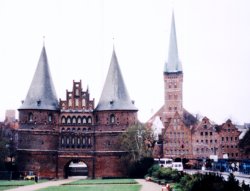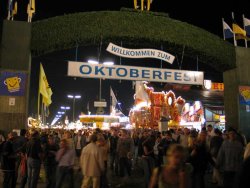Looking for a really different destination for your next trip? Well, maybe Siberia is for you…

Germany is well-known for some of its historic cities that look like they’re straight out of a fairytale, and Lübeck, the former capital of the Hanseatic League, certainly falls into this category. If you’re a medieval-architecture aficionado, you’ll be in your element here, with three areas listed as UNESCO World Heritage Sites.
The old city area is situated on an island in the middle of the river Trave. The town is famous for the towers that form one of its two remaining city gates, the Holstentor, located in the west of the city and likely to be the first landmark you see if you arrive by train.
Other famous sights include the Marienkirche, the imposing 14th-century Gothic-style cathedral – the third largest church in Germany; the Heiligen-Geist Hospital, a medieval almshouse; the Burgtor, the Castle Gate to the north of the city; and the 13th century town-hall in the centre of the city.
Lübeck has two youth hostels: the Altstadt hostel, located in the old city, about ten minutes walk from the railway station (84 beds, €17,10 per night), and Vor dem Burgtor, located at the north end of the city (211 beds, €16,00 per night).
There’s an hourly Regionalexpress rail service from Hamburg (50 minutes), and also from Kiel (one hour and twelve minutes), so Lübeck can make an ideal day trip from either of those two locations. Lübeck is also served by the rail/ferry service to Copenhagen, Denmark (four hours), via Puttgarden, and hence makes a worthy stop on a trip to Scandinavia.
British adventurer Jason Lewis has been circumnavigating the world for thirteen years using only his own legs as power, and the BBC reports that he has finally arrived home.
Lewis set out in 1994, from the UK, first by bike and then in a pedal boat across the English channel to France. Now, after a trip in which he was hit by a car and nearly had a leg amputated and was thrown into jail in Egypt, he has finally arrived back in Dorset.
The mind boggles as to how the world has changed in 13 years; the world-wide-web was only just starting out at that time, and there have been numerous conflicts and upheavals. Spending that much time on the move must surely leave a person in a state where they’re in for quite a few shocks upon returning home…
It’s rarely a good idea to arrive in a new town without any idea of why you’re going there, or what there is to see and do. Even if you carry a guidebook with you, you’ll likely waste a good deal of time scouring it for information, when you could be out enjoying your travel.
What should you be looking for? Well, looking into the history of a town is a great start. It can help explain many things, from just the layout of a town, to an insight into the behaviour, culture or language of its citizens.
Studying a map of the town before you arrive allows you to quickly gather your bearings, rather than wasting the first couple of hours of your time getting from the central station to your hostel, and learning how the public transport works will help you avoid being dumped on the outskirts of town by the wrong bus. And even if that does happen, at least you’ll know you had the right ticket and won’t get fined by roving inspectors.
So, where to start your research? It’s hard to go past Wikipedia. While there are justified concerns about the state of many of its articles, I’ve found that the standard of geographical articles to be high, and even if you don’t trust the content, the references can be excellent.
Check out the websites of universities and other educational institutions in the countries to which you’re travelling. Often their history departments will be the foremost authorities on their country’s past – not surprisingly – and may even publish their papers online, which could be great sources of information.
The Age is reporting that the commercial arm of the Lonely Planet, the publishers of the travel-guide books that many of us make considerable use of. The founds will keep a 25%25 stake of the company.
I will confess that I’m a big fan of the books (although a little less so of some of the maps in them), and have regularly used them for planning trips and for finding out-of-the-way places of interest that a traveller might not necessarily discover themselves. I realise that there’s a couple of diametrically opposed poles when it comes to guidebooks – those who consider them responsible for “cookie-cutter” travel and those who take one everywhere they go.
I definitely fall somewhere towards the latter group; you definitely need to research your destination before you go, and it really helps to know its history. It’s not always possible for people to spend weeks in a library or on the internet tracking down the right information, and a well-written guidebook can provide everything from useful history, to accomodation advice and transit planning. Furthermore, there’s always going to be a town or city where the attractions are so hidden, or off-beat, that a newcomer is unlikely to be able to find them for themselves, and a guidebook can definitely help them make the most of their trip.
So, with that said, I must say that I got somewhat of a shock to see Lonely Planet being sold. Obviously, they could have done far worse than the BBC; at least we can be sure that their editorial independence is safe – but I do wonder what happens in the long term if the BBC ever decides to sell…
I’ve now added Google Maps to the site, so those of you who are regular readers will notice that articles posted here will often have a map appearing at the bottom, where there were none before. Hopefully this feature will prove useful to help get people get their bearings when reading some of the articles.

Germany’s most famous festival is on again in Munich and if you happen to be in the vicinity, I thoroughly recommend making a visit. For the uninitiated, it’s a two week fiesta of food, socialising, fair-ground rides and of course, beer.
I was last there three years ago, arriving on the opening purely by chance, on my way back from a three week trip around the Balkans. It’s well worth dropping by, just to experience some of the wonderful Bavarian food.
Much has been made of the dearth of available accomodation without booking in advance, but I found that I was able to get into a reasonable priced hotel quite easily, just by looking on the net from an internet cafe opposite Munich’s main railway station. Even if it does prove problematic, Munich is served by a great public transport network, so staying in surrounding towns on the outskirts (for example Dachau) is always an option.
Jasmina Tešanović is a Serbian filmmaker and writer who became known worldwide when her diaries written during the 1999 war in Kosovo were distributed on the Internet. She has written some excellent articles on countries that were part of what was formerly known as Yugoslavia, and this month has been writing about South Korea.
Link: via BoingBoing
The Guardian explores the great outdoors, in a country that is also Europe’s last remaining dictatorship.
One of the more difficult things to do, while travelling, is to eat well. As you pass through unfamiliar places, it can be very tempting to grab fast food while you’re at a railway station, or even purchase the ghastly looking fried offerings from automatic machines – such as those in the Netherlands – to avoid having to deal with the not-speaking-the-language issue. After a while, eating like this can catch up with you and your body will start to react badly to sheer amount of grease and sugar you’ve consumed.
Even when eating at restaurants, hunger can get the better of you, and you might find yourself heading into the first place that you see, or you may find yourself gravitating towards a brand-name restaurant because it is familiar, without regard to the sort of food they sell.
I’ve found it handy to make extensive use of supermarkets, when I travel. The food is usually fresh, it’s an easy and cheap way to have lunch and importantly, you can see what you’ll be eating for making a commitment to it, unlike in a restaurant. Obviously, this won’t work for cooked meals, unless you’re lucky enough to have accommodation where you have access to a kitchen.
Markets, too, are a great place to buy food that is good for you, and generally they’re cheaper than supermarkets.
Try to stock up on fruit. If you’ve got a couple of apples or oranges spare, you’re less likely to find yourself handing over $5 for a single chocolate bar when a train attendant trundles through your carriage with a food trolley; keep in mind, however, that there may be country or regional areas with strict disease controls that prohibit the transport of fruit. Watch out for these, especially in Australia and the US.
Keeping small sealed packets of dry biscuits with you can also help ward off the pangs of hunger when you smell fried food.
Bear in mind that when you do have a sit-down meal at a restaurant, you don’t always have to have a full meal with a huge steak and chips – there’s certainly no harm in having a salad at times, although it’s best to only do this in countries with strict food standards, given that salads, by their very nature, aren’t cooked.

Recent Comments